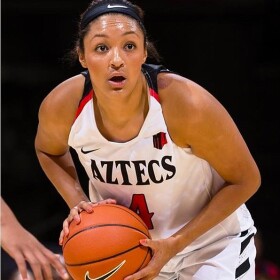A San Diego State University basketball player lost a cousin and her cousin's husband in the killing spree.
Senior Monique Terry was in El Paso running errands with her mom when she began getting texts, telling her that shots were fired at a Walmart in the West Texas city.
Terry’s cousin, Jordan Anchando, and her cousin‘s husband Andre died shielding their two-month-old son from the hail of bullets.
“My cousin had just dropped off her five-year-old daughter for cheerleading and she went to get school supplies at Walmart that same day, for her oldest daughter,” Terry said. “And it just…it doesn't make sense for her life to be stripped away from her. When she was only getting school supplies, because of where she was at and who she was around and where she lived. It’s just confusing and it’s not fair.”
The SDSU athlete is thankful she’s able to be with her family in El Paso at this difficult time. Relatives are trying to map out the future for her cousin’s orphaned children. The family set up a GoFundMe page.
“It’s a, it’s, it’s tough to talk about but it’s not okay at all,” Terry said. “She was only 24 and starting her life with three babies. Life isn’t fair, but this is one, I mean, that’s not fair for anybody.”
Terry is trying to understand the senseless deaths and she’s consoling Jordan’s mother.
Twenty-two people died in the El Paso shooting.








